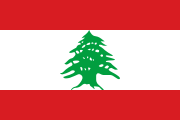
Back بوابة:لبنان Arabic بوابة:لبنان ARZ Portail:Liban French Portale:Libano Italian Portal:Lubnan Malay Portal:Líbano Portuguese Портал:Ливан Russian باب:لبنان Urdu Cổng thông tin:Liban Vietnamese
The Lebanon PortalA view of Byblos, Lebanon
 Lebanon (/ˈlɛbənɒn, -nən/ LEB-ə-non, -nən; Arabic: لُبْنَان, romanized: Lubnān, local pronunciation: [lɪbˈneːn]), officially the Republic of Lebanon, is a country in the Levant region of West Asia. It is bordered by Syria to the north and east, by Israel to the south, and by the Mediterranean Sea to the west; Cyprus lies a short distance away from the country's coastline. Lebanon is located at the crossroads of the Mediterranean Basin and the Arabian hinterlands. Lebanon has a population of more than five million people and covers an area of 10,452 square kilometres (4,036 sq mi). Beirut is the country's capital and largest city. The earliest evidence of human civilization in Lebanon dates back to 5000 BCE. From 3200 to 539 BC, what was to become Lebanon was part of Phoenicia, a maritime empire that stretched the Mediterranean Basin. In 64 BC, the region of Lebanon became part of the Roman Empire, which soon became a major center for Christianity under the aegis of the Byzantine Empire. After the 7th century, the region came under the rule of different caliphates, including the Rashidun, Umayyad and Abbasid caliphates. The 11th century saw the beginning of the Crusades and the establishment of Crusader states, which later fell to the Ayyubids and the Mamluks, and eventually to the Ottomans. Under Ottoman ruler Abdulmejid I, the first Lebanese proto-state was established in the form of the Mount Lebanon Mutasarrifate, created in the 19th century as a home for Maronite Christians under the Ottoman Tanzimat period. Lebanon is a developing country, ranked 112th on the Human Development Index. It has been classified as an upper-middle-income state. The Lebanese liquidity crisis, coupled with nationwide corruption and recent disasters such as the 2020 Beirut explosion, have precipitated the collapse of Lebanon's currency and fomented political instability, widespread resource shortages, and high unemployment and poverty. The World Bank has defined Lebanon's economic crisis as one of the world's worst since the 19th century. Despite the country's small size, Lebanese culture is renowned both in the Arab world and globally, powered primarily by the Lebanese diaspora. Lebanon is a founding member of the United Nations and of the Arab League, and is a member of the Non-Aligned Movement, the Organization of Islamic Cooperation, the Organisation internationale de la Francophonie, and the Group of 77, among others. (Full article...) This is a Featured article, one of the best articles Wikipedia has to offer.
The Roman temple of Bziza is a well-preserved first century AD building dedicated to Azizos, a personification of the morning star in ancient Arab polytheism. This Roman temple lends the modern Lebanese town of Bziza its current name, as Bziza is a corruption of Beth Azizo meaning the house or temple of Azizos. Azizos was identified as Ares by Emperor Julian. The tetrastyle prostyle building has two doors that connect the pronaos to a square cella. To the back of the temple lie the remains of the adyton where images of the deity once stood. The ancient temple functioned as an aedes, the dwelling place of the deity. The temple of Bziza was converted into a church and underwent architectural modification during two phases of Christianization; in the Early Byzantine period and later in the Middle Ages. The church, colloquially known until modern times as the Lady of the Pillars, fell into disrepair. Despite the church's condition, Christian devotion was still maintained in the nineteenth century in one of the temple's niches. The temple of Bziza is featured on multiple stamps issued by the Lebanese state. (Full article...)Did you know (auto-generated) -
TopicsRelated portalsReligions in Lebanon Arab states Other countries This is a Good article, an article that meets a core set of editorial standards.
 General imagesThe following are images from various Lebanon-related articles on Wikipedia.
CategoriesAssociated WikimediaThe following Wikimedia Foundation sister projects provide more on this subject:
SourcesDiscover Wikipedia using portals |
© MMXXIII Rich X Search. We shall prevail. All rights reserved. Rich X Search























































